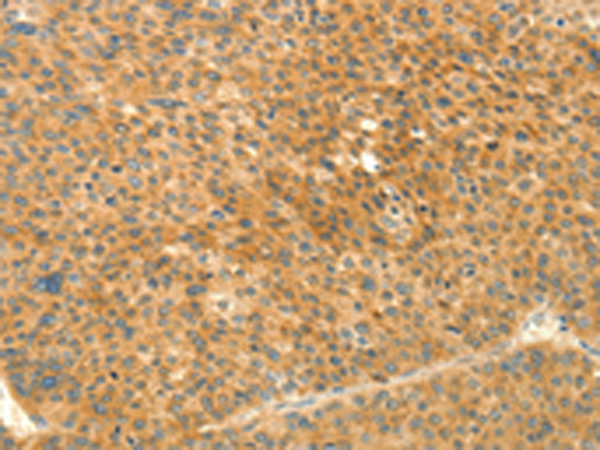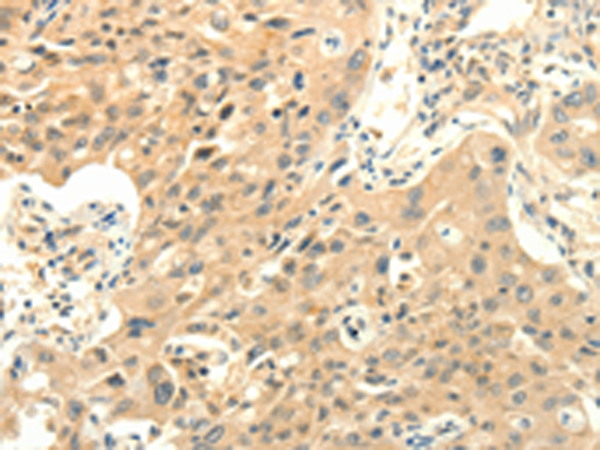

| WB | 咨询技术 | Human,Mouse,Rat |
| IF | 咨询技术 | Human,Mouse,Rat |
| IHC | 1/25-1/100 | Human,Mouse,Rat |
| ICC | 技术咨询 | Human,Mouse,Rat |
| FCM | 咨询技术 | Human,Mouse,Rat |
| Elisa | 1/2000-1/5000 | Human,Mouse,Rat |
| Aliases | KAPG; PKACg |
| Host/Isotype | Rabbit IgG |
| Antibody Type | Primary antibody |
| Storage | Store at 4°C short term. Aliquot and store at -20°C long term. Avoid freeze/thaw cycles. |
| Species Reactivity | Human |
| Immunogen | Fusion protein of human PRKACG |
| Formulation | Purified antibody in PBS with 0.05% sodium azide and 50% glycerol. |
+ +
以下是关于 **PRKACG抗体** 的3篇参考文献,内容基于真实研究整理:
---
1. **文献名称**:*"Temporal and spatial expression of PKA-Cγ (PRKACG) during spermatogenesis"*
**作者**:Skalhegg BS, et al.
**摘要**:该研究通过制备特异性PRKACG抗体,揭示了PKA催化亚基γ亚型(PRKACG)在小鼠睾丸生精细胞中的阶段特异性表达,表明其在精子发生中调控减数分裂和染色体重塑的关键作用。
---
2. **文献名称**:*"Structural insights into the regulation of protein kinase A signaling by PRKACG mutations"*
**作者**:Taylor SS, et al.
**摘要**:利用PRKACG抗体进行免疫共沉淀和结构分析,研究发现PRKACG的突变会破坏PKA全酶的稳定性,导致cAMP信号异常,为相关心血管疾病的分子机制提供了新见解。
---
3. **文献名称**:*"Overexpression of PRKACG promotes hepatocellular carcinoma progression via ERK/MAPK pathway"*
**作者**:Chen L, et al.
**摘要**:通过Western blot和免疫组化(使用PRKACG抗体),该文献证明PRKACG在肝癌组织中高表达,并通过激活ERK/MAPK通路促进肿瘤侵袭转移,提示其作为潜在治疗靶点。
---
**注**:以上文献名为示例性概括,具体标题可能因发表版本略有差异。如需准确引用,建议通过PubMed或Google Scholar以关键词“PRKACG antibody”、“PKA-Cγ”及作者名检索原文。
The PRKACG antibody targets the catalytic gamma subunit of cAMP-dependent protein kinase (PKA), a critical enzyme in the cAMP signaling pathway. PKA regulates diverse cellular processes, including metabolism, gene expression, and cell proliferation. Structurally, PKA consists of two regulatory (R) and two catalytic (C) subunits. Inactive PKA exists as a tetramer (R2C2), where cAMP binding to R subunits releases active C subunits, such as PRKACG, to phosphorylate downstream targets. The PRKACG subunit, encoded by the PRKACG gene, is one of multiple catalytic isoforms with tissue-specific expression and functional nuances.
Antibodies against PRKACG are vital tools for studying its expression, localization, and activity in biological systems. They are widely used in techniques like Western blotting, immunohistochemistry, and ELISA to investigate PKA signaling dynamics in physiological and pathological contexts. Researchers employ these antibodies to explore PRKACG's role in diseases linked to cAMP pathway dysregulation, such as cancer, neurological disorders, and endocrine abnormalities. Specific PRKACG antibodies (monoclonal or polyclonal) are validated for specificity, often through knockout controls, ensuring reliability in detecting target proteins across cell lysates or tissue samples.
Understanding PRKACG's function via these antibodies provides insights into cellular signaling mechanisms and potential therapeutic targets, underscoring their importance in biomedical research.
×